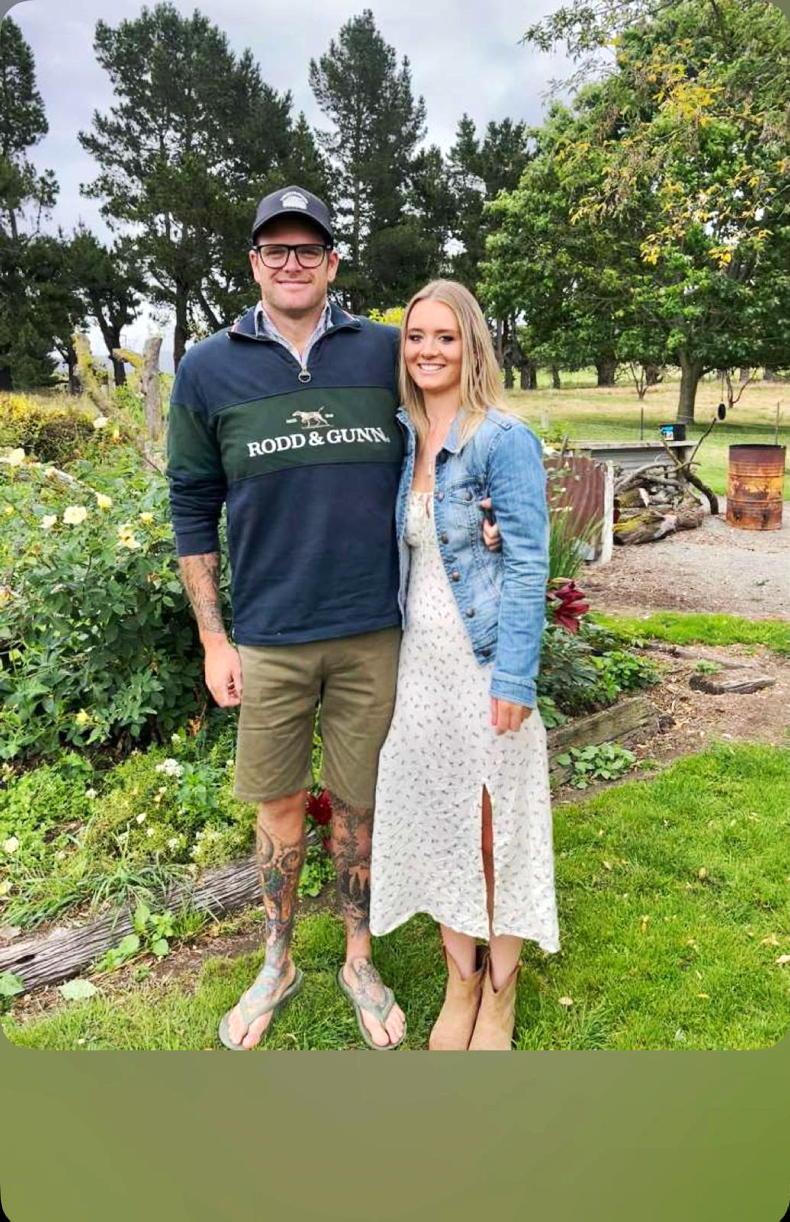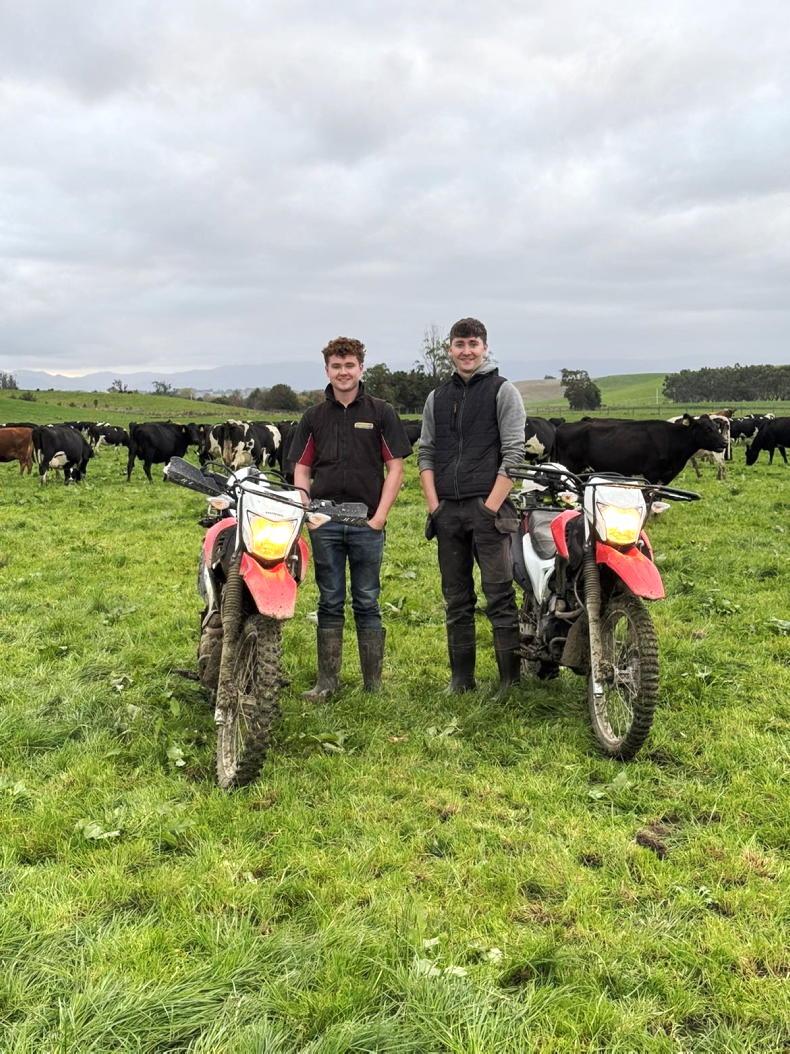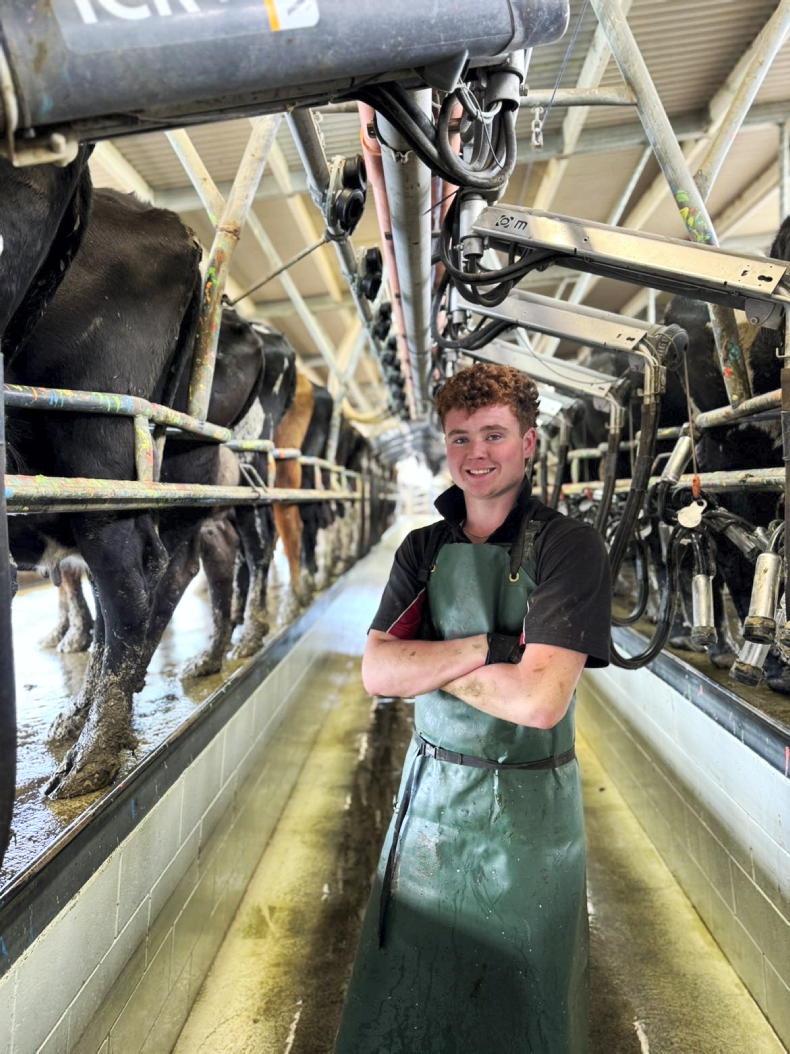With New Zealand’s dairy industry facing an ongoing demand for skilled workers, agricultural students from all over the island of Ireland are seizing a unique opportunity to develop their skills in one of the world’s most advanced dairy farming environments.
Currently, 70 students from leading agricultural institutions, including Kildalton Agricultural College, South East Technological University (SETU), Munster Technological University (MTU), Ballyhaise Agricultural College, Atlantic Technological University (ATU), CAFRE, and Queen’s University in Northern Ireland, are gaining hands-on experience on Kiwi dairy farms.
This forms a critical part of their degree’s practical placement allowing them to apply classroom learning to large-scale, pasture-based dairy operations. New Zealand’s dairy sector is globally recognised for its innovation and efficiency, and workers from Ireland are highly sought-after due to their strong work ethic and experience in livestock management.

Alex Patello and Meg Patterson farm near Timaru, South Canterbury on the South Island of New Zealand.
This opportunity is facilitated by Max People, a workforce solutions company based in New Zealand and founded by two Irish entrepreneurs, Dave McSorley and Gavin Bannon. The initiative is about filling roles and creating a meaningful learning experience.
Alex Patello and his partner, Meg Patterson, have been hiring Irish workers for the last seven years as a result of the labour challenges in New Zealand. At the moment, they have two MTU students carrying out their third-year placement.
Alex says, “I am an equity partner with Craigmore farming and we run a multi-farm system operating over 1,100ha, which is made up of two dairy farms (Somerset and Pareora), a cropping block (Sunnybrae), and two young stock blocks (Otama and Dellows) near Timaru, on the South Island.”
The system he is running allows him to grow their young stock from calves into first-time milkers and crops for the dairy season and wintering. They also run bulls for breeding and trade cattle.
Similar to farmers in Ireland, the biggest challenge Alex faces is the unpredictability of the weather.
“The weather is always a challenge in our area. Long dry periods can result in a shut-off of irrigation, which directly affects dairy farms and the ability to grow feed. However, this season has been one out of the bag with the start of spring being cold, and low sun hours affecting ground conditions and slow growth. But the summer we have received plenty of rain and warm days to help push the grass ahead into the autumn,” he says.
Across the five properties, they hire 10-15 people, which is no easy task. Alex prides himself on looking after his staff, and providing them with a good work-life balance is very important.

Kalum Buckley and Micheál Cronin – both MTU students – working on Alex Patello’s farm in New Zealand.
“All staff are provided with accomodation and motorbikes. As we have two dairy farms, we take on two Irish who can live together, work on each farm, but have the same time and days off so they can explore with each other and their friends,” he says.
The biggest benefit for Alex in hiring people from Ireland is that “the Irish come to New Zealand to learn, and they have a love for dairy. The positive energy when they turn up to see the scale and how we do things is great.”
It is vital that students gain experience and time on different farm enterprises, according to Alex, as there is so much to learn and so many different ways to farm.
“Finding the correct way to fit and implement some of the practical training they learn while in New Zealand on their farms back home can allow them to challenge the norm, ‘change their system’ or fine-tune it, which could lead to more profit. Pasture management is one of the biggest things the Irish come here to learn,” says Alex.
Kalum Buckley, Killarney,
Co Kerry
Kalum’s father is the third generation to operate their dairy farm. Kalum was brought up on the farm alongside his father, grandparents and grand-uncle.
“My grandparents and my grand-uncle, who all lived on our out farm, sadly passed away in recent years, but the passion for farming has been passed down to the younger generation. I always had a keen interest in cattle and machinery from a young age,” he says.
When it came to choosing a college course, Kalum decided to study at MTU Kerry where he earned his Green Cert, staying close to home.
“I’m able to commute in and out every day. This helps save the cost of accommodation and allows me to still work at home,” he adds.
Kalum is in New Zealand milking 750 cows in a 80-unit herringbone parlour.

Kalum Buckley and Micheal Cronin two MTU students working on Alex Patello's farm in New Zealand.
“The main difference in dairy farming in New Zealand is no indoor housing, and all animals are calved outdoors. Grass makes up the majority of the diet, along with fodder beet and silage.
“Kale is fed during the dry season. Irrigation here is also due to the warmer weather, as it rains less and all the effluent/run off from the milking parlour is spread out through pivots [irrigation].”
The biggest challenge Kalum faced when he started working on Alex’s farm was getting used to the two-wheelers that are used to get cows out of the paddocks at milking time.
“Moving away from home during the calving season was also a bit tough, as I like to know what’s going on in the farm.
“But students with a keen interest in dairy farming should work in New Zealand to experience larger-scale farms and enhance their knowledge of cow health and treating stock. Farming methods from New Zealand can be brought into dairy farms at home to increase profits and reduce costs,” says Kalum.
Once he is finished college, Kalum is planning on farming full-time at home.
Micheál Cronin, Kiskeam,
Co Cork
Growing up on a suckler cattle and dry stock farm led Micheál to develop an interest in cattle and machinery.
“I decided to study at MTU Kerry as I was interested in the agricultural science programme and wanted the opportunity to work in bigger agricultural companies. Another advantage of MTU Kerry was how close it is to home. I’m able to drive to college every morning and have no accommodation to pay for,” he says.
The farm Micheál is working on for Alex has an 800-cow herd with a 60-bale rotary milking parlour.
Before heading to New Zealand, he had never milked in a rotary parlour and that took him a while to get used to.
“I learned a lot about the diets of cattle here and how strict they are on grazing paddocks to ensure the cows get sufficient intake for maximum milk production.
“I also learned cows are bred here for high fat and protein percentages in the milk as they are paid by the solids rather than the litres, which is different to home,” he says.

Kalum Buckley and Micheal Cronin two MTU students working on Alex Patello's farm in New Zealand.
Micheál thinks other students with an interest in agriculture should be encouraged to come out and see the differences in the farm structures to understand what works well.
“I’d love to go milking cows at home as the suckler herds are getting harder to make a profit from, and there is still a massive future in milk,” he says.
The next intake for placements commencing in June and July is underway, in line with New Zealand’s peak calving season with 50 roles available.
See maxpeople.ie
With New Zealand’s dairy industry facing an ongoing demand for skilled workers, agricultural students from all over the island of Ireland are seizing a unique opportunity to develop their skills in one of the world’s most advanced dairy farming environments.
Currently, 70 students from leading agricultural institutions, including Kildalton Agricultural College, South East Technological University (SETU), Munster Technological University (MTU), Ballyhaise Agricultural College, Atlantic Technological University (ATU), CAFRE, and Queen’s University in Northern Ireland, are gaining hands-on experience on Kiwi dairy farms.
This forms a critical part of their degree’s practical placement allowing them to apply classroom learning to large-scale, pasture-based dairy operations. New Zealand’s dairy sector is globally recognised for its innovation and efficiency, and workers from Ireland are highly sought-after due to their strong work ethic and experience in livestock management.

Alex Patello and Meg Patterson farm near Timaru, South Canterbury on the South Island of New Zealand.
This opportunity is facilitated by Max People, a workforce solutions company based in New Zealand and founded by two Irish entrepreneurs, Dave McSorley and Gavin Bannon. The initiative is about filling roles and creating a meaningful learning experience.
Alex Patello and his partner, Meg Patterson, have been hiring Irish workers for the last seven years as a result of the labour challenges in New Zealand. At the moment, they have two MTU students carrying out their third-year placement.
Alex says, “I am an equity partner with Craigmore farming and we run a multi-farm system operating over 1,100ha, which is made up of two dairy farms (Somerset and Pareora), a cropping block (Sunnybrae), and two young stock blocks (Otama and Dellows) near Timaru, on the South Island.”
The system he is running allows him to grow their young stock from calves into first-time milkers and crops for the dairy season and wintering. They also run bulls for breeding and trade cattle.
Similar to farmers in Ireland, the biggest challenge Alex faces is the unpredictability of the weather.
“The weather is always a challenge in our area. Long dry periods can result in a shut-off of irrigation, which directly affects dairy farms and the ability to grow feed. However, this season has been one out of the bag with the start of spring being cold, and low sun hours affecting ground conditions and slow growth. But the summer we have received plenty of rain and warm days to help push the grass ahead into the autumn,” he says.
Across the five properties, they hire 10-15 people, which is no easy task. Alex prides himself on looking after his staff, and providing them with a good work-life balance is very important.

Kalum Buckley and Micheál Cronin – both MTU students – working on Alex Patello’s farm in New Zealand.
“All staff are provided with accomodation and motorbikes. As we have two dairy farms, we take on two Irish who can live together, work on each farm, but have the same time and days off so they can explore with each other and their friends,” he says.
The biggest benefit for Alex in hiring people from Ireland is that “the Irish come to New Zealand to learn, and they have a love for dairy. The positive energy when they turn up to see the scale and how we do things is great.”
It is vital that students gain experience and time on different farm enterprises, according to Alex, as there is so much to learn and so many different ways to farm.
“Finding the correct way to fit and implement some of the practical training they learn while in New Zealand on their farms back home can allow them to challenge the norm, ‘change their system’ or fine-tune it, which could lead to more profit. Pasture management is one of the biggest things the Irish come here to learn,” says Alex.
Kalum Buckley, Killarney,
Co Kerry
Kalum’s father is the third generation to operate their dairy farm. Kalum was brought up on the farm alongside his father, grandparents and grand-uncle.
“My grandparents and my grand-uncle, who all lived on our out farm, sadly passed away in recent years, but the passion for farming has been passed down to the younger generation. I always had a keen interest in cattle and machinery from a young age,” he says.
When it came to choosing a college course, Kalum decided to study at MTU Kerry where he earned his Green Cert, staying close to home.
“I’m able to commute in and out every day. This helps save the cost of accommodation and allows me to still work at home,” he adds.
Kalum is in New Zealand milking 750 cows in a 80-unit herringbone parlour.

Kalum Buckley and Micheal Cronin two MTU students working on Alex Patello's farm in New Zealand.
“The main difference in dairy farming in New Zealand is no indoor housing, and all animals are calved outdoors. Grass makes up the majority of the diet, along with fodder beet and silage.
“Kale is fed during the dry season. Irrigation here is also due to the warmer weather, as it rains less and all the effluent/run off from the milking parlour is spread out through pivots [irrigation].”
The biggest challenge Kalum faced when he started working on Alex’s farm was getting used to the two-wheelers that are used to get cows out of the paddocks at milking time.
“Moving away from home during the calving season was also a bit tough, as I like to know what’s going on in the farm.
“But students with a keen interest in dairy farming should work in New Zealand to experience larger-scale farms and enhance their knowledge of cow health and treating stock. Farming methods from New Zealand can be brought into dairy farms at home to increase profits and reduce costs,” says Kalum.
Once he is finished college, Kalum is planning on farming full-time at home.
Micheál Cronin, Kiskeam,
Co Cork
Growing up on a suckler cattle and dry stock farm led Micheál to develop an interest in cattle and machinery.
“I decided to study at MTU Kerry as I was interested in the agricultural science programme and wanted the opportunity to work in bigger agricultural companies. Another advantage of MTU Kerry was how close it is to home. I’m able to drive to college every morning and have no accommodation to pay for,” he says.
The farm Micheál is working on for Alex has an 800-cow herd with a 60-bale rotary milking parlour.
Before heading to New Zealand, he had never milked in a rotary parlour and that took him a while to get used to.
“I learned a lot about the diets of cattle here and how strict they are on grazing paddocks to ensure the cows get sufficient intake for maximum milk production.
“I also learned cows are bred here for high fat and protein percentages in the milk as they are paid by the solids rather than the litres, which is different to home,” he says.

Kalum Buckley and Micheal Cronin two MTU students working on Alex Patello's farm in New Zealand.
Micheál thinks other students with an interest in agriculture should be encouraged to come out and see the differences in the farm structures to understand what works well.
“I’d love to go milking cows at home as the suckler herds are getting harder to make a profit from, and there is still a massive future in milk,” he says.
The next intake for placements commencing in June and July is underway, in line with New Zealand’s peak calving season with 50 roles available.
See maxpeople.ie













SHARING OPTIONS